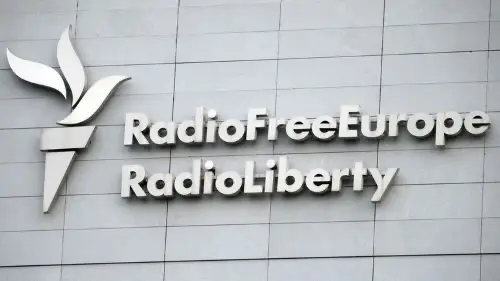Trump vs. Radio Liberty – Why Europe Now Has to Save the Legacy of a Free Press.
It is one of those stories where historical irony and political reality painfully overlap. Radio Free Europe/Radio Liberty – originally founded to counter Soviet propaganda – has now become a victim of authoritarian arbitrariness. Not in Moscow, but in Washington. More precisely: in the White House under Donald Trump.
While the newsroom of this historic international broadcaster works day by day to deliver independent information to Russia, Iran, or Uzbekistan, its own funding is being cut off. Seventy-five million US dollars had already been approved by Congress for the current fiscal year. But the Trump administration is withholding the money – without explanation, without transparency, and without respect for democratic oversight.
What is presented as fiscal necessity – the need for “cuts” – quickly reveals itself to be an ideological agenda. Kari Lake, Trump’s influential adviser, has publicly labeled the Radio Liberty family as “anti-American.” She oversaw the dismissal of more than 500 employees at Voice of America and its parent agency. Contracts were canceled, international bureaus shuttered, voices silenced.
Now, the very countries that these broadcasters were originally meant to support are stepping in: the Europeans. Last week, the EU provided six million euros in emergency aid. Sweden has pledged another two million. This is not just a symbolic act of solidarity – it is a last-minute intervention. Dozens of editorial teams were already on the brink, contracts frozen, programming reduced, journalists placed on furlough.
Steve Capus, president of Radio Free Europe/Radio Liberty, spoke in Brussels of a “rescue operation in an emergency.” The broadcaster remains “existentially threatened” as long as Washington fails to release the approved funds. As recently as Monday, Capus had to go back to court, seeking a temporary restraining order to force the release of the May budget. A federal judge had already ordered the administration to pay $12 million in April – but legal certainty is no longer assured.
EU foreign policy chief Kaja Kallas put it succinctly: the rescue is a “short-term emergency measure to safeguard independent journalism.” But the deeper question remains: why must Europe step in when an American president is dismantling his own publicly funded international broadcasting network?
The answer lies in the structure. Radio Liberty has always been an instrument of American public diplomacy. But the political polarization in the United States, Trump’s contempt for critical journalism, and the ideological radicalization of his administration make one thing clear: this structure is no longer sustainable. If a press institution depends solely on the goodwill of the executive branch, it is not free – it is vulnerable.
Rick Stengel, a former undersecretary of state under Obama, has proposed a new solution: a transatlantic funding model. RFE/RL, jointly supported by EU states and the US, could be protected from domestic political attacks. “It was once a postwar project to counter the Soviet shadow,” says Stengel. “Now it is time for a relaunch – as a shared defense of the free press.”
Because what is at stake is more than a broadcasting network. It is a symbolic bulwark against the logic of lies. Against the ideology of indifference. And against a new generation of authoritarian leaders – those who secure their power not through arguments, but through the systematic destruction of the public sphere.
That this threat now comes from Washington itself shows that the defense of truth is no longer just a geopolitical issue. It is a civilizational one. And it begins – with a radio station.
